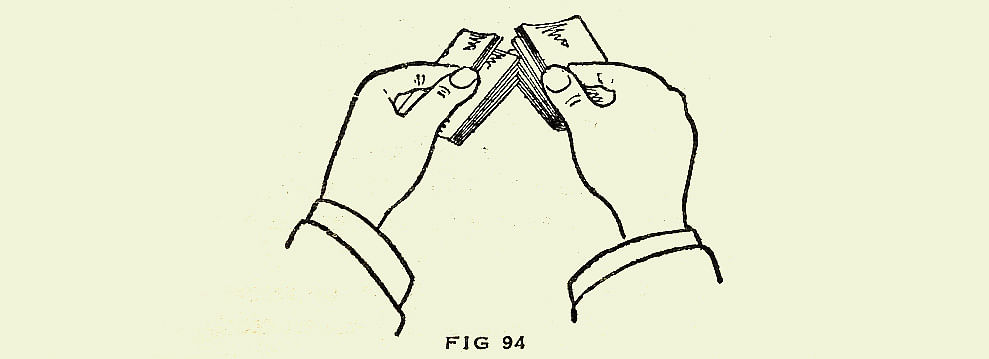Sleight of Hand
Remember when your Grandpa, or that Uncle, pulled a coin from behind your ear when you were a kid? That’s the first time we ever really encounter sleight of hand magic. SPOILER ALERT: Grandpa was secretly hiding the coin in his hand and made it seem like he pulled it from your ear. Of course we all know that now, but at the time, didn’t it feel like the most amazing thing you’d ever seen? That’s what you can create when you study sleight of hand.

This page was created to give you a list of resources to help you improve your manual dexterity and learn sleight of hand. This branch of magic is almost certainly the most rewarding. It will allow you to perform magic with borrowed objects at your friend’s house, at school, at the bar, when your family come over. At a moment’s notice, you can perform card tricks with any deck of cards. Someone can hand you a coin and ask you to “do something” and if you learn the basics of coin magic, you’ll be able to amaze your audience.
From card magic with playing cards to money magic with coins and bills, when you study sleight of hand, a whole new world opens up to you.
Here’s a list of where you can get started learning sleight of hand today:
12 Essential Sleight Of Hand Moves
What Are Popular Sleight Of Hand Magic Books
Sleight Of Hand For Magicians
10 Quick Tips To Improve Your Sleight Of Hand
Mercury Card Fold
Sleight of Hand FAQ
Is It Slight or Sleight of Hand?
When a magician performs an amazing magic trick, they are using “sleight of hand”. The noun “sleight” is rooted in the Norse word for skillful handiwork and refers to “dexterity and skill” or “deceitful craftiness”. It is often used to describe a magician's feats of skill, intricate hand movements or other cunning maneuvers.
Furthermore the noun phrase "sleight of hand” is characterized as a “cleverly executed trick or deception" and/or "a conjuring trick necessitating manual dexterity, skill, or adroitness". Put more simply, it describes the artful manipulation of playing cards, coins or other objects, as well as precision and finesse when executing magic tricks and illusions. Conducting "sleight of hand" often requires adept hand movements that take significant practice and a keen understanding of misdirection.
While it is typically written as “sleight of hand”, it is also acceptable to write it as “sleight-of-hand”. However, it should never be written as "slight" of hand. The word “slight” means a “slim build” or “small amount”, both of which are unrelated to magic tricks.
How does Sleight of Hand work?
The short story is that magicians worked out how to control what their audience sees - or perceive they see. Watch this video to see how easy it is to trick the brain.
You never think it was possible to do what happens in this next video. All you need to do is count how many times the basketball is passed.
See, you weren’t expecting that, were you?
It’s easy to understand how if your brain can filter out an entire gorilla, it can also filter out aspects of magic sleight of hand without you even realizing it.
Remember…
Or rather, don’t. Another secret of getting sleight of hand magic to work is that the brain really isn’t good at remembering things it deems to be unimportant. So much of magic uses this knowledge. You will swear blind that the magician didn’t do something, when he did, and that is how the whole trick fundamentally works.
Don’t feel bad about this, it’s just science!
Never Assume
Another amazing thing the brain does that helps sleight of hand artists perform tricks is it assumes things all the time. It will assume a deck of card being taken out of a sealed box is devoid of artífice. When in fact, it could be a special deck of cards used to do magic with. It will assume a coin is regular, because it knows what coins are. In fact, there are a range of special coins magicians use to achieve their effects.
Good Luck
We hope you enjoy learning sleight of hand, click on any of the links above to get started - be warned though, once you start, it’s very hard to stop!
